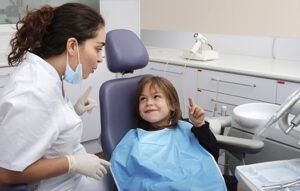05/01/2022 by Sarah Pena

It’s never too early for kids to begin learning how to practice good dental hygiene habits. By developing consistent habits in the form of regular teeth brushing and flossing, eating nutritious foods and seeing a dentist on a regular basis, a child is much more likely to have a wonderful set of strong, healthy teeth throughout their life.
Those who consistently invest in their dental health over the course of their lifetime are much more likely to enjoy a confident, attractive smile. Equally important, they’re also better able to avoid painful dental issues that often arise from poor oral hygiene habits. Of course, sometimes the main factor that determines whether a person ultimately follows a good dental hygiene path or whether they follow the opposite – a path of neglect – is due to the habits they developed during their childhood years.
It may come as a surprise, but the word “cavity” is simply another name for tooth infection. When left untreated, tooth decay can be painful for a child to experience. Children with cavities may also have:
Children with poor oral health also have more trouble getting a good night’s sleep due to their discomfort. They may develop digestive issues and lose weight, since they’re not able to properly chew their food.
According to the CDC, 1 in 5 children between the ages of 2 and 5 — the years critical to proper speech development — have at least one cavity in their baby teeth. The CDC also reports that school-age children who have poor oral hygiene miss more school days and have poorer grades than children with healthy teeth.
As compelling as these dental-related health issues are, some parents may still wonder why baby teeth are important, because eventually they will be replaced with permanent teeth. In reality, there are multiple reasons why baby teeth can have a significant impact on a child’s dental health, even after they’re all gone.
Crooked teeth — According to the Mayo Clinic, losing a baby tooth early from untreated tooth decay disrupts the normal transition process from baby teeth to permanent teeth. Normally, when a permanent tooth is in position to break through the surface of the gum, it’s the permanent tooth itself that pushes on the baby tooth, causing it to eventually loosen.
When a child loses a baby tooth to tooth decay, the permanent tooth may not necessarily be in position. When the permanent tooth finally comes in, it may have drifted from its correct location. This means it’s more likely to break through in an abnormal location, thus crowding other permanent teeth. Ultimately, this can lead to multiple crooked teeth that will then require future orthodontic care.
Gum disease — Another reason centers around gum disease. If a child develops gum disease due to excessive cavities in their baby teeth, merely losing their baby teeth doesn’t eliminate the gum disease that has developed. If a child continues to have gum disease as their permanent teeth come in, it sets them up for further dental issues down the road.
While poor oral hygiene at any age can lead to health issues, the good news is that with preventive dental care, most, if not all, of these health conditions can be avoided. This is especially true in children, since they don’t have decades of neglect to address.
First and foremost, parents can make good dental hygiene as much a priority in their child’s life as they do eating nutritious food and getting enough sleep.
Next, the American Dental Association recommends that parents take their child to their first dental appointment whenever their first baby tooth appears. This is the ideal time for a child’s first dental appointment for several reasons.
Beyond examining the child to make sure their teeth and gums look healthy, it’s an ideal time for a dentist to discuss the importance of eating healthy, nutritious food supportive of good oral health. A dentist can also provide recommendations as to when and how to begin a regular regimen of tooth brushing and flossing for a child. As a general rule, most dentists tell parents they can begin a twice-daily toothbrushing regimen when their child reaches their second birthday, although in some cases they may recommend parents start even earlier.
A dentist can also provide expert advice as to how often a child should receive a dental exam. Regular dental exams for children can help parents stay on track as to whether their child’s teeth, gums and jaw are healthy and are developing normally. If a dental, gum or jaw issue should arise, regular checkups with a dentist mean the problem will be caught and addressed sooner rather than later.
For more helpful tips and ideas, visit the MouthHealthy website created by the American Dental Association.
At North Country HealthCare, we offer a variety of helpful services designed to keep your child’s smile bright and healthy. We offer everything from comprehensive dental exams, teeth cleaning and digital X-rays, to fluoride treatments, sealants and tooth fillings. If you would like to know more about how to develop good dental hygiene habits for your child, please contact us!
Summer in Arizona means beautiful blue skies, sunny days, and plenty of time spent outdoors. But with all that sunshine, it’s important to remember th …
Measles is a highly contagious and potentially deadly disease with confirmed cases in 35 states, including Arizona. It can be dangerous, especially fo …
If you’re age 45 or older, it’s time to schedule your colonoscopy. We know, it’s not really anyone’s idea of a good time, but colonoscopies are a powe …
Is basic dental care available for adults?